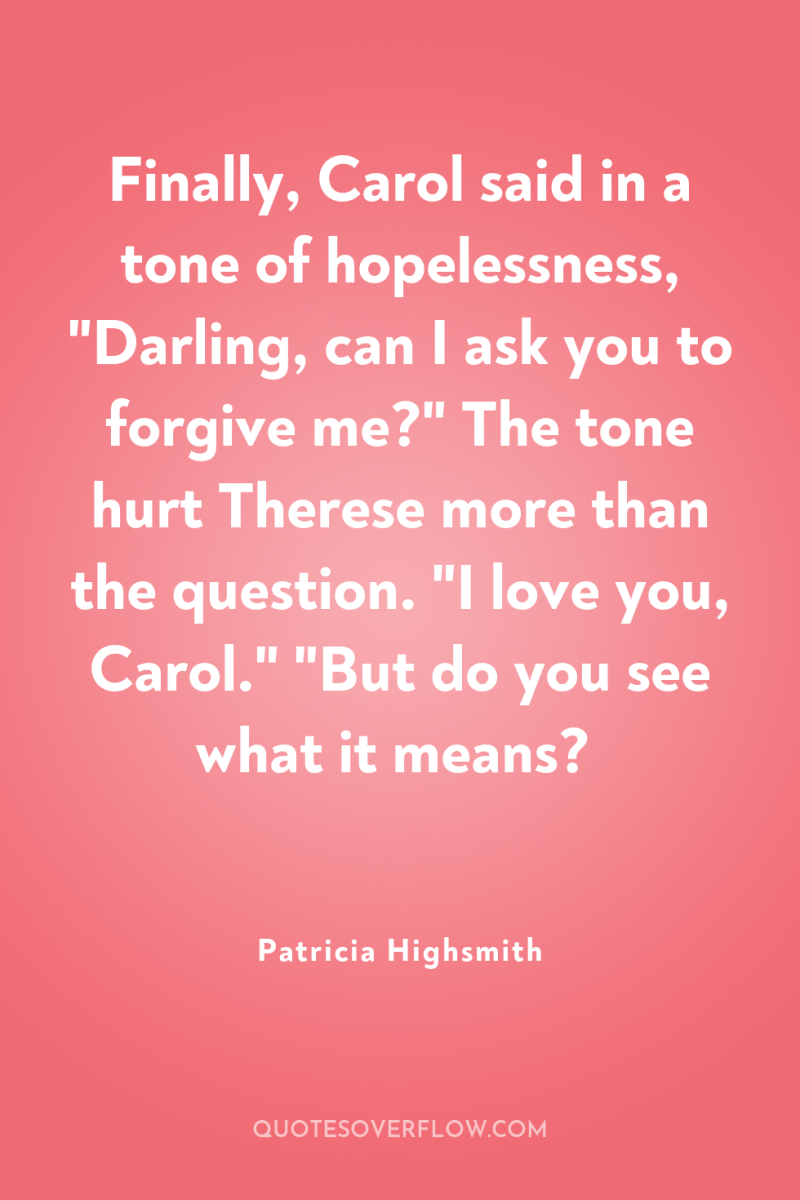I know you have it in you, Guy, " Anne said suddenly at the end of a silence, "the capacity to be terribly happy.Patricia Highsmith

Finally, Carol said in a tone of hopelessness, "Darling, can I ask you to forgive me?" The tone hurt Therese more than the question. "I love you, Carol." "But do you see what it means?Patricia Highsmith

I do not understand people who like to make noise; consequently I fear them, and since I fear them, I hate them.Patricia Highsmith

I have a definite psychosis in being with people. I cannot bear it very long.Patricia Highsmith
![One blow in anger [would] kill, probably, a child from...](https://cdn.quotesoverflow.com/file/quotesoverflow/images/one-blow-in-anger-would-kill359449595638-1200.webp)
One blow in anger [would] kill, probably, a child from aged two to eight. Those over eight would take two blows to kill.Patricia Highsmith
Outside, under the marquee of the hotel, he stood a moment as he did each night beneath the marquee of the Hotel Hyperion, while he decided what direction to take, what to do. And suddenly, realizing it was not the Hotel Hyperion, that the circumstances were quite different, he felt loneliness spring up like a dark forest all around him. The odd thing was, he felt no impulse to hurry after her, to find her somehow. What would he have to offer her except the history of weakness, loneliness, and inadequacy, the decline and fall of himself? He himself was the core of the loneliness around him, and its core was inadequacy. He was inadequate even in love.Patricia Highsmith
I read, write and create. I must lose myself in work, so that there is no space for the other/anything else.Patricia Highsmith
Fantasy, an unflagging optimism is necessary for a writer at all stages of this rough game. A kind of madness is therefore necessary, when there is every logical reason for a state of depression and discouragement. Perhaps the fact that I can react with utter gloom to this is what keeps me from being psychotic and keeps me merely neurotic. I am doing quite a good day's work today. But I am also aware of the madness that actually sustains me, and I am not made more comfortable or happy by it.Patricia Highsmith
Life is a long failure of understanding, a long, mistaken shutting of the heart.Patricia Highsmith
One situation — maybe one alone — could drive me to murder: family life, togetherness.Patricia Highsmith
But there were too many points at which the other self could invade the self he wanted to preserve, and there were too many forms of invasion: certain words, sounds, lights, actions his hands or feet performed, and if he did nothing at all, heard and saw nothing, the shouting of some triumphant inner voice that shocked him and cowed him.Patricia Highsmith
What chance combination of shadow and sound and his own thoughts had created it?Patricia Highsmith
I have been sadder than any man could be: for nothing in the world was made for me.Patricia Highsmith
Each person carries around in himself a terrible other world of hell and the unknown. It is an enormous pit reaching below the deepest crater of the earth, or it is the thinnest air far beyond the moon. But it is frightening and essentially “unlike” man as he knows himself familiarly, so we spend all our days living at the other antipodes of ourself.Patricia Highsmith
And she did not have to ask if this was right, no one had to tell her, because this could not have been more right or perfect.Patricia Highsmith
What immense satisfaction it must be to fashion a story like [Maupassant's]! One must say 'fashion' because it is not merely writing, but massing and cutting away like a sculptor, chiseling lean and clear. And to put one's work confidently in the crucible of Time; to know that in six perfect pages is the finest form of one's idea: This satisfaction is the only true reward of the artist, and this his highest possible joy on Earth.Patricia Highsmith
I had depressing thoughts that the theme, even though I had thought of it, was better than I was as a writer. Henry James or Thomas Mann could easily write it, but not I. 'I'm thinking of writing it from the point of view of someone at the hotel who observes her, ' I said, but this did not fill me with much hope. Then my friend, who is not a writer, suggested I try it from the omniscient author's point of view. .Patricia Highsmith
The law was not society, it began. Society was people like himself and Owen and Brillhart, who hadn't the right to take the life of another member of society. And yet the law did. "And yet the law is supposed to be the will of society at least. It isn't even that. Or maybe it is collectively, " he added, aware that as always he was doubling back before he come to a point, making things as complex as possible in trying to make them certain.Patricia Highsmith
She had seen just now what she had only sensed before, that the whole world was ready to be their enemy, and suddenly what she and Carol had together seemed no longer love or anything happy but a monster between them, with each of them caught in a fist.Patricia Highsmith
I'd had a little feeling of destiny. Because, you see, what I mean about affinities is true from friendships down to even the accidental glance at someone on the street-there's always a definite reason somewhere. I think even the poets would agree with me.Patricia Highsmith
One interesting thing is that a stage is reached when nothing hurts any more. Things cannot become any worse, finally, for the one who is really depressed.Patricia Highsmith
The taste of Scotch, though Guy didn’t much care for it, was pleasant because it reminded him of Anne. She drank Scotch, when she drank. It was like her, golden, full of light, made with careful art.Patricia Highsmith
My imagination functions much better when I don't have to speak to people.Patricia Highsmith
I tell him his business, all business, is legalized throat-cutting, like marriage is legalized fornication.Patricia Highsmith
I like to drink when I travel. It enhances things, don’t you think?Patricia Highsmith
Obsessions are the only things that matter.Patricia Highsmith
It was the seventh or eighth floor, she couldn't remember which. A streetcar crawled past the front of the hotel, and people on the sidewalk moved in every direction, with legs on either side of them, and it crossed her mind to jump.Patricia Highsmith
Therese leaned closer toward it, looking down at her glass. She wanted to thrust the table aside and spring into her arms, to bury her nose in the green and gold scarf that was tied close about her neck. Once the backs of their hands brushed on the table, and Therese’s skin there felt separately alive now, and rather burning.Patricia Highsmith
That's exactly where you're wrong! Any kind of person can murder. Purely circumstances and not a thing to do with temperament! People get so far -- and it takes just the least little thing to push them over the brink. Anybody. Even your grandmother. I know.Patricia Highsmith
He could feel the belligerence growing in Freddie Miles as surely as if his huge body were generating a heat that he could feel across the room.Patricia Highsmith
Honesty, for me, is usually the worst policy imaginable.Patricia Highsmith
Her life was a series of zigzags. At nineteen, she was anxious.Patricia Highsmith
The justice I have received, I shall give back.Patricia Highsmith
The word “marriage” lingered in Guy’s ears, too. It was a solemn word to him. It had the primordial solemnity of holy, love, sin. It was Miriam’s round terra cotta-coloured mouth saying, “Why should I put myself out for you?” and it was Anne’s eyes as she pushed her hair back and looked up at him on the lawn of her house where she planted crocuses. It was Miriam turning from the tall thin window in the room in Chicago, lifting her freckled, shield-shaped face directly up to his as she always did before she told a lie, and Steve’s long dark head, insolently smiling.Patricia Highsmith
At any rate, Therese thought, she was happier than she ever had been before. And why worry about defining everything?Patricia Highsmith
My story can move fast, as I can't, it can have a reasonable and perhaps perfect solution, as mine can't. A solution that is somehow satisfying, as my personal solution never can be.Patricia Highsmith
Carol raised her hand slowly and brushed her hair back, once on either side, and Therese smiled because the gesture was Carol, and it was Carol she loved and would always love. Oh, in a different way now because she was a different person, and it was like meeting Carol all over again, but it was still Carol and no one else. It would be Carol, in a thousand cities, a thousand houses, in foreign lands where they would go together, in heaven and in hell. Therese waited. Then as she was about to go to her, Carol saw her, seemed to stare at her incredulously a moment while Therese watched the slow smile growing, before her arm lifted suddenly, her hand waved a quick, eager greeting that Therese had never seen before. Therese walked toward her.Patricia Highsmith
...It had all happened in that instant she had seen Carol standing in the middle of the floor, watching her. Then the realization that so much had happened after that meeting made her feel incredibly lucky suddenly. It was so easy for a man and woman to find each other, to find someone who would do, but for her to have found Carol-Patricia Highsmith
What else mattered except being with Carol, anywhere, anyhow?Patricia Highsmith
They roared into the Lincoln Tunnel. A wild, inexplicable excitement mounted in Therese as she stared through the windshield. She wished the tunnel might cave in and kill them both, that their bodies might be dragged out together. She felt Carol glancing at her from time to time.Patricia Highsmith
And when all's said and done, the final comment will be (from me at least) so what? I'll live with my neuroses. I'll try to develop patience, with my handicapped personality. But I prefer to live with my neuroses and try to make the best of them.Patricia Highsmith
Once a person has become detached from his possessions, his customary duties, his moments of solitude, where is he? What is he?Patricia Highsmith
And everything was made of paper: sentences, pardons, pleas, bad records, demerits, proof of guilt, but never, it seemed, proof of innocence. If there were no paper, Carter felt, the entire judicial system would collapse and disappear.Patricia Highsmith
He did look like an Italian of the worse type, though Vic didn't think he was, and it was an insult to the Italian race to assume that he was. He resembled no particular race, only an amalgamation of the worst elements of various Latin peoples. He looked as if he had spent all his life dodging blows that were probably aimed at him for good reason.Patricia Highsmith
Honestly, I don't understand why people get so worked up about a little murder!Patricia Highsmith
For the hundredth time, he examined his face in the bathroom mirror, patiently touched every scratch with the styptic pencil, and repowdered them. He ministered to his face and hands objectively, as if they were not a part of himself. When his eyes met the staring eyes in the mirror, they slipped away as they must have slipped away, Guy thought, that first afternoon on the train, when he had tried to avoid Bruno’s eyes.Patricia Highsmith
It shook Therese in the profoundest part of her where no words were, no easy words like death or dying or killing Those words were somehow future, and this was present. An inarticulate anxiety, a desire to know, know anything for certain, had jammed itself in her throat for a moment she felt she could hardly breathe.Patricia Highsmith
Perhaps it was a statement after all: I don’t want to die without knowing you. Do you feel the same way, Carol? She could have said the last question, but she could not have said all that went before it.Patricia Highsmith
Carol looked at her. "How do you become a poet?"" By feeling things - too much, I suppose, " Therese answered conscientiously.Patricia Highsmith
Was it love or wasn't it that she felt for Carol? And how absurd it was that she didn't even know. She had heard about girls falling in love, and she knew what kind of people they were and what they looked like. Neither she nor Carol looked like that. Yet the way she felt about Carol passed all the tests for love and fitted all the descriptions.Patricia Highsmith
She thought of people she had seen holding hands in movies, and why shouldn't she and Carol?Patricia Highsmith
Do people always fall in love with things they can't have?'' Always, ' Carol said, smiling, too.Patricia Highsmith
Robert Walker as Bruno was excellent. He had elegance and humor, and the proper fondness for his mother.Patricia Highsmith
I only know it takes weeks to recover, as if one had been in a car accident.Patricia Highsmith